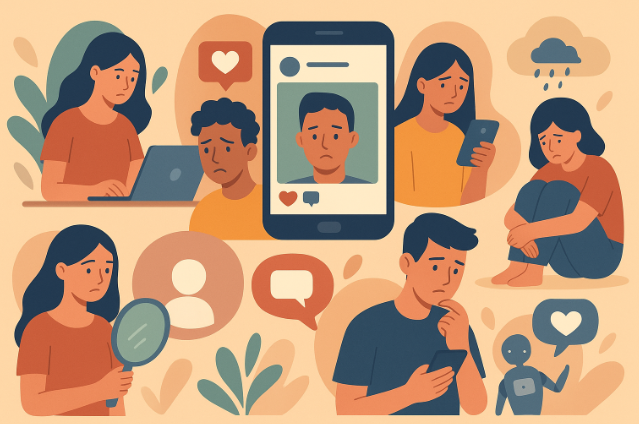
Social media has become not merely a place for sharing moments but an everyday space where we communicate, learn, debate, and often fall into the comparison trap. As platforms evolve, so does the science examining them. Digital psychology is now delving deeper into how these platforms are shaping our minds, relationships, and identities. Below are some of the most recent psychological discoveries about the effects of social media.
1. The Loneliness Paradox
A nine-year longitudinal study conducted in 2025 by the University of Baylor refuted the assumption that active participation in social media directly combats isolation. The researchers found that both active (posting, commenting) and passive (scrolling, watching) use resulted in a similar outcome: increased loneliness over time.
Passive browsing often triggers social comparison and feelings of exclusion.
Continuous posting may not meet the deeper need for real connection, offering interaction without intimacy.
- The pattern is self-reinforcing: loneliness leads to more social media use, which in turn increases loneliness.
- Implication: Online relationships rarely replace the complexity of offline ones.
2. Adolescents and Mental Health: Vulnerability Matters
Mental Health Profiles and Use
One of the largest UK studies (3,382 teenagers aged 11–19) found notable differences in how young people interacted with social media, depending on their mental health status.
Anxious and depressed profiles: More time online, higher comparison rates, greater sensitivity to feedback.
Externalizing profiles (impulsivity, behavioural issues): Heavy use, but less affected by social comparison.
Those in clinical groups were less satisfied with online friendships compared to peers without mental health conditions.
Addiction vs. Time
A four-year US cohort study revealed that addictive behaviours—not just high screen time—raise the risk of self-harm and suicidal thoughts. Warning signs include:
- Compulsive checking
- Distress when offline
- Prioritising screens over daily needs
- Compared to non-addicted users, risks were 1.5–3 times higher.
3. Focus, Memory, and Mental Fatigue
Exposure to fast-paced media like TikTok and Instagram Reels has been linked to reduced sustained attention, weaker working memory, and decreased cognitive control among older adolescents and young adults. The brain adapts to rapid stimulation, making slower activities (reading, studying) feel harder.
However, a Curtin University study using objective smartphone tracking found no clear link between overall time spent on social media and poor mental health. In some cases, certain types of use were linked to better attention control—showing that how you use a platform matters more than how long.
4. The Digital Mirror: Self-Image and Validation
The Looking-Glass Self 2.0
Building on early 20th-century sociologist Charles Cooley’s concept, today’s “looking-glass self” is shaped by instant feedback through likes, comments, and shares. This makes self-worth more fragile.
Filter-Driven Dysmorphia
Platforms like Instagram and Snapchat have driven the rise of “Snapchat Dysmorphia,” where heavily edited images inspire real-life cosmetic changes. This trend increases the risk of body dysmorphia, especially in adolescents.
Parasocial Influence
Parasocial relationships—one-sided emotional bonds with influencers—can significantly shape behaviour. Young audiences may value an influencer’s opinion as much as that of a real-life friend, sometimes mistaking marketing for genuine connection.
5. Persuasion, Algorithms, and AI
Bias Bubbles & Echo Chambers
Algorithmic feeds can unintentionally narrow our worldview, reinforcing existing beliefs, polarising opinions, and limiting exposure to diverse perspectives. Over time, this may weaken critical thinking.
AI-Powered Influence
Recent studies show AI can tailor persuasive messages to an individual’s personality and values—raising ethical concerns over manipulation.
Fake Friends: Chatbots
AI companions are becoming more human-like. While they can ease loneliness, they may foster dependency or spread misinformation. Experts recommend using them alongside, not instead of, real relationships.
6. The Benefits Still Matter
Despite well-documented risks, intentional social media use can have positive effects:
- Education: Improves literacy, numeracy, and problem-solving in children.
- Support: Provides safe spaces for self-expression and coping, especially for marginalised groups.
- Activism: Boosts awareness, civic action, and global causes.
The key lies in conscious, purposeful use rather than mindless scrolling.
7. Gen Z’s Changing Attitude
Surveys show a cultural shift: over 50% of Gen Z (about 60% of teens) say they wish social media didn’t exist. One in four has taken a full digital detox. This generation is increasingly prioritising face-to-face communication and authenticity over constant online presence.
8. Research Recommendations
- Track usage type – Are you engaging actively or passively? Treat the condition, not the clock – Focus on compulsive habits, not hours spent.
- Build offline self-esteem – Develop identity and worth independent of digital validation.
- Teach algorithm awareness – Understand how your feed is shaped and why.
- Set purposeful limits – Use app timers or scheduled breaks.
- Leverage the positives – Engage with uplifting, educational content.
- Balance AI companionship – Don’t replace human contact with chatbots.
9. Conclusion: Complex but Manageable
Social media’s effects are not black-and-white—they depend heavily on context.
- Risks: Loneliness, reduced attention, dependency, distorted self-image
- Benefits: Learning, connection, empowerment
- Mediators: Mental health status, type of content, style of engagement, algorithmic role
A healthy relationship with social media depends on awareness, intention, and balance. As technology and AI evolve, users and policymakers must remain vigilant to ensure that online spaces support, rather than harm, mental well-being.
